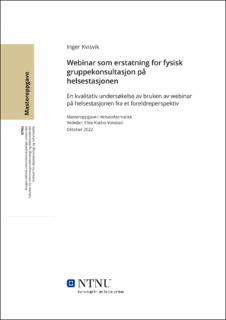| dc.contributor.advisor | Vonstad, Elise Klæbo | |
| dc.contributor.author | Kvisvik, Inger | |
| dc.date.accessioned | 2023-01-31T18:19:27Z | |
| dc.date.available | 2023-01-31T18:19:27Z | |
| dc.date.issued | 2022 | |
| dc.identifier | no.ntnu:inspera:122095699:56790581 | |
| dc.identifier.uri | https://hdl.handle.net/11250/3047552 | |
| dc.description.abstract | Bakgrunn: I mars 2020 ble Norge, som resten av verden, rammet av Covid-19, en global pandemi. Krav om sosial distansering medførte at helsesektoren måtte tenke nytt for å kunne utføre sine tjenester. I Trondheim kommune ble det på grunn av pandemien og krav om sosial distansering utviklet ferdig innspilte webinar, som ble tilbudt foreldre ved barnets 4 ukers-, 4 måneders- og 8 måneders alder istedenfor deres opprinnelige tilbud om fysisk gruppekonsultasjon. Omstillingen måtte gå raskt og det var i begrenset grad mulig å kvalitetssikre slike nye tilbud. Oppgaven er et bidrag til å belyse hvorvidt digitale samhandlingsverktøy som webinar er «best practice» for gruppekonsultasjoner på helsestasjonen fra et foreldreperspektiv. Kan webinar ivareta målene med gruppekonsultasjonen, og er det samsvar mellom helsedirektoratets mål for disse konsultasjonene og foreldres motivasjon?
Metode: Det er gjennomført en kvalitativ undersøkelse med semistrukturert intervju av seks mødre til barn som har benyttet Trondheim kommune sitt tilbud om webinar ved 4 ukers-, 4 måneders- og/eller 8 måneders konsultasjon ved helsestasjonen. Intervjuene ble transkribert og analysert etter stegvis deduktiv-induktiv modellen.
Resultater/konklusjon: Helsedirektoratets mål om at helsestasjonsprogrammet skal bidra til å skape sosiale nettverk og til at foreldre får innsikt, forståelse og hjelp til å mestre foreldrerollen ble ikke ivaretatt ved å bruke asynkrone webinar. Ved å bruke webinar, fikk ikke foreldrene mulighet til å lære av andre, lære gjennom refleksjon eller å stille spørsmål om tema de er usikre på.
Det var en framtredende diskrepans mellom helsedirektoratets mål for de aktuelle gruppekonsultasjonene og foreldrenes motivasjon for deltakelse. Foreldre hadde i liten grad motivasjon med tanke på å lære noe av gruppekonsultasjonene, men hadde som hovedmotivasjon å møte andre. Informantene opplevde webinarene som troverdige, men som overfladiske med tanke på tematikk/innhold.
Ved å bruke asynkrone webinar kan ikke helsestasjonen, fra et foreldreperspektiv, ivareta målene med gruppekonsultasjon, og det er ikke samsvar mellom helsedirektoratets mål for gruppene og foreldres motivasjon. | |
| dc.description.abstract | Background: In March 2020, Norway as the rest of the world was hit by Covid-19, a global pandemic. Because of social distancing requirements the health sector had to adapt their deliverance of services. In the public health station in Trondheim municipality, social distancing requirements led to the development of pre-recorded webinars that was given to parents as a substitute for physical group consultations when the child was 4 weeks- 4 months- and 8 months old. This was a substitute for their original physical group consultations. This change happened quickly and there was limited possibilities of quality assurance of this new method. This thesis is a contribution to the quality assurance of the use of pre-recorded webinars from a parental perspective. Are webinars «best practice» for group consultations at the public health station? Can webinars meet the Directorate of Health’s goals for these group consultations and is there a correlation between The Directorate of Health goals for these group consultations and the parents’ motivation for participation?
Method: A qualitative study was conducted, using a semi structured interview of six mothers to children that had used the pre-recorded webinars that was offered from the health station in Trondheim municipality at 4 weeks- 4 months- and/or 8 months consultation. The interviews were transcribed and analyzed using the stepwise deductive-inductive model.
Results/conclusion: The Directorate of Health’s goals for the consultations at the health station are to contribute to social networking and to give parents insight, understanding and help to master parenting. These goals will not be achieved using pre-recorded webinars. By using pre-recorded webinars parents are not able to learn from others, learning through reflection and by asking questions about subjects they feel unsure about. There is a salient discrepancy between the Directorate of Health goals for the specific group consultations and the parents’ motivation for participation. Parents has a low degree of motivation towards learning. Their main motivation for these group consultations is to meet other parents and health workers. The parents feel that the pre-recorded webinars are trustworthy but superficial in accordance to the content. By using pre-recorded webinars, the health station will not achieve the Directorate of Health goals for the group consultation form a parents’ perspective. There is not a correlation between the Directorate of Health goals and the parents’ motivation to these group consultations. | |
| dc.language | nob | |
| dc.publisher | NTNU | |
| dc.title | Webinar som erstatning for fysisk gruppekonsultasjon på helsestasjonen
En kvalitativ undersøkelse av bruken av webinar på helsestasjonen fra et foreldreperspektiv | |
| dc.type | Master thesis | |
